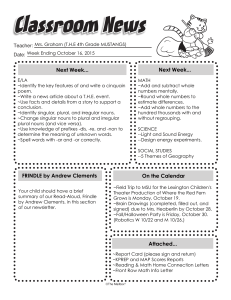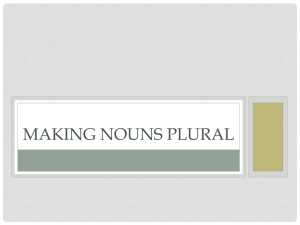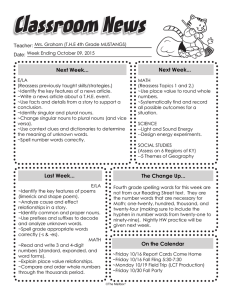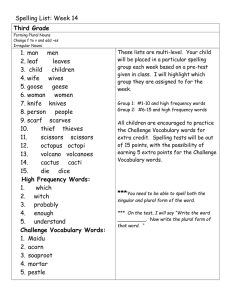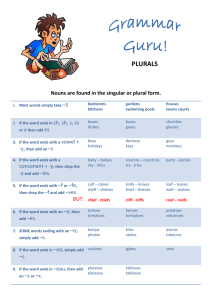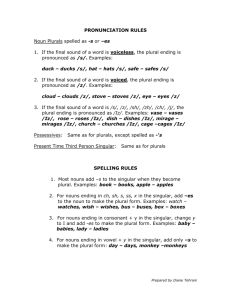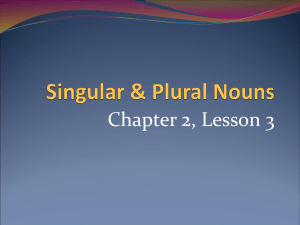N O U N S
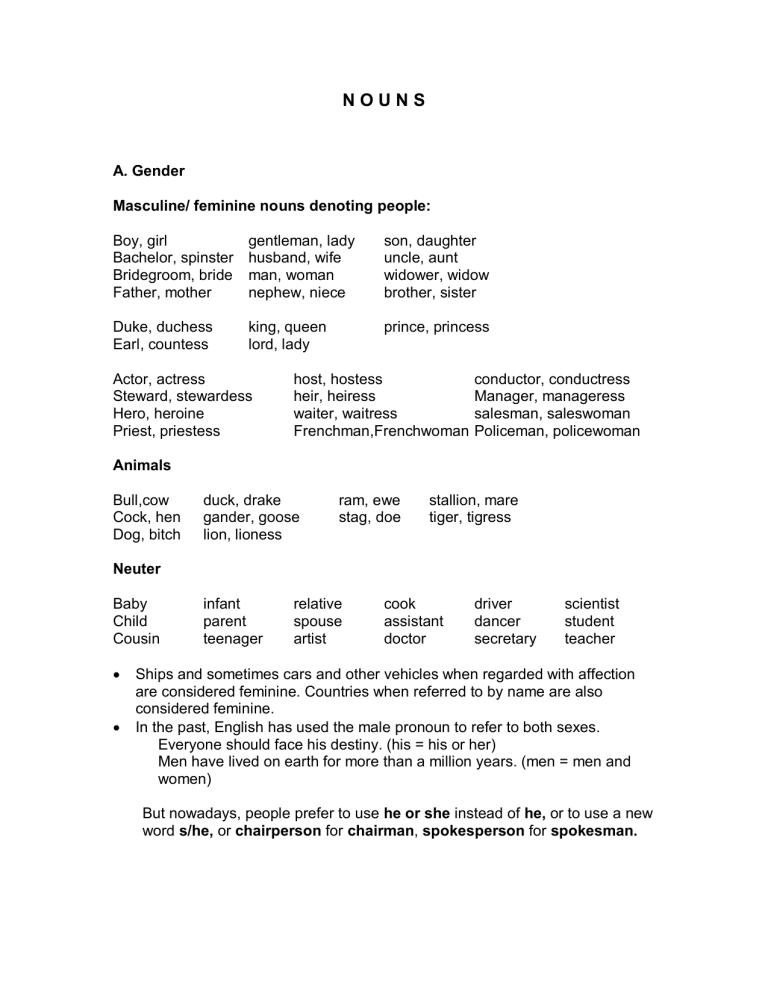
N O U N S
A. Gender
Masculine/ feminine nouns denoting people:
Boy, girl gentleman, lady son, daughter
Bachelor, spinster husband, wife uncle, aunt
Bridegroom, bride man, woman
Father, mother nephew, niece widower, widow brother, sister
Duke, duchess king, queen
Earl, countess lord, lady
Actor, actress
Steward, stewardess
Hero, heroine
Priest, priestess host, hostess heir, heiress prince, princess waiter, waitress conductor, conductress
Manager, manageress salesman, saleswoman
Frenchman,Frenchwoman Policeman, policewoman
Animals
Bull,cow duck, drake
Cock, hen gander, goose
Dog, bitch lion, lioness
Neuter
Baby
Child
Cousin ram, ewe stag, doe infant parent relative spouse teenager artist cook doctor stallion, mare tiger, tigress driver assistant dancer scientist student secretary teacher
Ships and sometimes cars and other vehicles when regarded with affection are considered feminine. Countries when referred to by name are also considered feminine.
In the past, English has used the male pronoun to refer to both sexes.
Everyone should face his destiny. (his = his or her)
Men have lived on earth for more than a million years. (men = men and women)
But nowadays, people prefer to use he or she instead of he, or to use a new
word s/he, or chairperson for chairman , spokesperson for spokesman.
B. Plural
1. The plural of a noun is usually made by adding s to the singular:
Day, days dog, dogs house, houses s is pronounced /s/ after p , k , or f sound. Otherwise it is pronounced /z/ cups books laughs
2. Nouns ending in o , ch , sh , ss , or x form their plural by adding es :
Tomato, tomatoes brush, brushes box, boxes
Church, churches kiss, kisses
3. Words of foreign origin or abbreviated words ending in o add s only:
Dynamo, dynamos
Kilo, kilos kimono, kimonos piano, pianos photo, photos soprano, sopranos
4. Nouns ending in y following a consonant form their plural by dropping the y and adding ies :
Baby, babies
Boy, boys country, countries day, days fly, flies
5. Nouns ending in y following a vowel form their plural by adding s : lady, ladies donkey, donkeys guy, guys
6. Twelve nouns ending in f or fe drop the f or fe and add ves :
Calf, half, knife, leaf, loaf, life, self, sheaf, shelf, thief, wife, wolf:
Wife, wives
7. The nouns hoof, scarf, and wharf take either s or ves .
8. Other words ending in f or fe add s in the ordinary way:
Cliff, cliffs handkerchief, handkerchiefs
9. A few nouns form their plural by a vowel change:
Foot, feet
Goose, geese louse, lice mouse, mice man, men tooth, teeth
10. The plural of child and ox are children , oxen safe, safes woman, women
11. Names of certain creatures do not change in the plural.
Fish, mackerel, squid, salmon
Deer, sheep
12. Others add s :
Crabs, lobsters, sharks, sardines
13. Collective nouns (team, crew, class, family, government, etc.) can take a singular or plural verb.
14. Certain words are always plural:
Clothes, breeches, pants, pyjamas, trousers, binoculars, glasses, scissors, damages, goods, stairs, surroundings, etc.
15. Names of science is mostly singular
Mathematics, physics, economics, etc.
16. Words like news , mumps , billiards , dominoes , bowls are plural in form but singular in meaning.
17. Some words which come from their original Greek or Latin forms make their plurals according to the rules of Greek or Latin:
Crisis, crises phenomenon, phenomena datum, data
18. But some follow the English rules:
Dogma, dogmas formula, formulas gymnasium, gymnasiums
19. For compound nouns, normally the last word is made plural:
Boy-friends travel agents
20. But where man and woman is prefixed both parts are made plural:
Man driver, men drivers woman driver, women drivers
21. The first word is made plural with compounds formed of verb + er nouns + adverbs:
Hangers-on runners-up
22. And with compounds composed of noun + preposition + noun:
Sisters-in-law
23. Initials can be made plural:
MPs (Members of Parliament)
VIPs (very important persons)
UFOs (unidentified flying objects)
